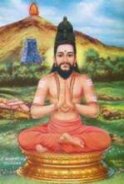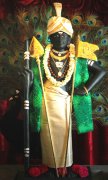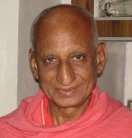

THE ESOTERIC
KANDAR ANUBHUTI
OR
THE SECRET TEACHING ON
GOD-EXPERIENCE
(A Treatise on Adwaitic Realization)
OF
SAINT ARUNAGIRINATHAR

 |  THE ESOTERIC KANDAR ANUBHUTI OR THE SECRET TEACHING ON GOD-EXPERIENCE (A Treatise on Adwaitic Realization) OF SAINT ARUNAGIRINATHAR |  |
 | by N.V. Karthikeyan |  |
| verses contents 11 12 13 14 15 16 17 18 19 20 .. 26 this verse in PDF version (4 parts) p-1 p-2 p-3 p-4 complete download of this book |
VERSE-16 பேராசைஎனும் பிணியில் பிணிபட்டு ஓராவினையேன் உழலத் தகுமோ வீரா முதுசூர்பட வேல் எறியும் சூரா சுரலோக துரந்தரனே.Peraasai enum piniyil pinipattu Oraa vinaiyen uzhalat thakumo Veeraa muthusoor-pada vel eriyum, Sooraa suraloka thurantharane. Afflicted by the deadly disease of inordinate desires, Commentary When the seeker intensifies his Sadhana and tries to melt his mind (as prayed for in Verse-15), he finds that it is not an easy job. Here we would do well to remember that the transition from one verse to another takes some time. It is not that the seeker starts putting into practice the instruction of the previous verse and the experience or reaction mentioned in the subsequent verse comes the next day. When he continues the practice sincerely for some time (say some months or even years) then the condition stated in the next verse is experienced by the Sadhaka. Thus, when the gross desires that project themselves through the avenues of the five senses (verse 14) have been considerably checked by prolonged practice, the subtle desires in the sub-conscious mind start teasing the Sadhaka when he continues the practice and tries to melt his mind. It stirs up the hidden, latent desires and cravings buried in the subconscious mind. It is like sweeping the floor of a room kept locked for years where dust has settled like a carpet, says Swami Sivananda. The dust that is settled comes up and even blurs the sweeper's vision, not allowing him to continue sweeping. But if he wants to clean the room he has to boldly continue somehow. Such is the condition of the sincere seeker. When he tries to melt his mind in God by intense Sadhana, he finds that his subconscious mind is full of unfulfilled desires and cravings (பேராசை) which he himself eagerly entertained in earlier lives due to lack of discriminative understanding, not knowing what was good for him. This bundle of inordinate desires and cravings is a disease (பேராசை எனும் பிணி) not of the body which goes when the body dies, but of the mind which makes one revolve in the cycle of birth and death (உழலுதல்) by goading him for repeated fulfillment of those desires. So, in addition to intensification of Japa, he takes refuge in the Lord for a cure of this dreaded disease: "O Lord! I am of evil Karmas and bereft of discrimination; afflicted by the disease of cravings and inordinate desires, should I whirl (in this cycle of birth and death)? Is it fair, O Lord? Please save." Throughout the period of Sadhana we find this cycle -- (Sadhana -- obstacles - surrender/prayer - grace -- overcome the obstacle) in a more and more subtle form, until the Goal is reached. We may try to understand what Arunagiri intends by 'peraasai' - பேராசை. It is not just greed or avarice, as it is usually understood. Every experience we undergo -- big or small, good or bad, holy or unholy, desirable or undesirable, mundane or spiritual -- simultaneously leaves an impression in the sub-conscious mind. These impressions are called the Samskaras. From these Samskaras, Vaasanas or subtle desires arise and come to the conscious mind (which is memory, a Vritti) seeking repetition of those enjoyments. When thus enjoyments are repeated, they leave further impressions or Samskaras, which thicken the already existing Samskaras. Thus when desires, due to repeated enjoyment, get thickened and take deep root in the sub-conscious mind, they become inordinate or stubborn cravings, referred to in the verse as 'peraasai' (பேராசை). They deprive man of his discrimination and make him a slave, and force him to take birth after birth in different species for their fulfillment (உழலுதல்). This is a disease difficult to cure. Even the practice of the Divine Name (Japa), as prayed for in the previous verse, is difficult of achievement, because of these inordinate desires. It is no wonder that people often think it a mere waste of time to sit and chant/sing the Lord's Name. Their inordinate desires for wealth and enjoyment do not allow them to sit quietly even for a few minutes, think of the Lord and enjoy inner peace. What a power these desires have! They shake the very personality, agitate the mind and senses, and not allow man to be peaceful. Man is fooled by his desires that drive him move outward, strive for wealth and pleasures which are not lasting and which bring pain in their train. People are helplessly tossed about by their desires. Poor man! He does not know that he is a puppet moved by desires. How aptly did Arjuna ask Lord Krishna, "Impelled by what, O Lord, does man commit sin, though against his wishes, constrained, as it were, by force?" (Gita III-36 & 37). And the blessed Lord revealed the fact, the secret of secrets, that it is this desire and this anger that are the causes of all sinful deeds, that prompt men to sinful action, much against their wishes. Desire and anger (anger is only another form of desire) are the causes of human suffering. All sins can ultimately be traced to these two violent forces. This world-show is kept up by desires. Desires are insatiable. The more we give them, the more they want. It is like pouring ghee over fire that will burn brighter consuming the ghee and wanting more. Every satisfaction adds strength to desire which craves further satisfaction. And if anything stands in the way of its satisfaction, it causes anger; and we know the disastrous consequences of anger. Man loses his balance and becomes verily a beast. So much for desires! Thus, desires lead to undesirable results, whereas the practice of the Divine Name is sweet and soothing even while being uttered, brings solace to the heart and in the end bestows salvation to the soul. Yet, the inordinate desires goad man to strive for the perishable things of the world and make him suffer throughout. He revolves, caught up in this wheel of desires - now for this and now for that. Man is nothing but a tool in the hands of desires. Arunagirinathar traces the cause of this disease of desire to non-discrimination. In this, he sums up the whole of human life, its suffering and its cause. Human life is characterised by suffering. There is no real happiness in this embodied life. Even the so-called pleasure is considered by men of wisdom as only pain; because all pleasure, apart from being momentary and false, ends in pain, craving for further enjoyment, restlessness, anxiety and sin. What is the cause of this misery of ours? Embodiment! The state of embodied existence is the cause of our sufferings. Now, embodiment is due to karmas. Karmas bring us into existence in this mortal world. Why do we do karmas? Because of love or hatred (Raaga and dwesha), desire or aversion, we act; and attachment is the cause of love or hatred. Attachment to certain persons and things necessarily implies aversion to other things and persons and this is due to non-discrimination or lack of proper understanding. As everything is the creation of God, as everything is a limb of the Universal Being, as there is nothing outside God, as God has become all this, as God indwells all things, as everything shall pass away-there is no reason to love certain things and hate certain others; but to do so is Aviveka (non-discrimination), which is the cause of all our suffering and unhappiness. Though Ajnana (ignorance) is the cause of Aviveka, for all practical purposes, we may consider non-discrimination itself as the final cause for the disease of desire, embodiment, and suffering. 'Peraasai' or cravings are the cause of repeated births and deaths, and so it is referred to as a disease. In fact it is the real disease. Bodily ailments and diseases are not real diseases, because they trouble us for a short while and are cured afterwards. Even mental disorders can be cured or kept in check. Even chronic or incurable diseases last only as long as the body lasts, and when the body dies, they too go with the body. They do not cause rebirth nor do they follow one in one's next birth. But these inordinate desires or cravings do not leave a person even in subsequent births; rather they are the cause of rebirths. Unfulfilled desires trouble a man throughout the present life, cause rebirth and continue to trouble him in many future births. As we have seen earlier, since desires can never be fulfilled, they cause endless births, until they are sublimated or evaporated by spiritual Sadhana coupled with Divine Grace. This sublimation is possible only through a discriminative understanding of the nature of desire, its cause and methods of sublimation (for details refer to verse 14), by taking refuge in the Lord. Hence the seeker weeps before the Lord and appeals for His grace and mercy. To which Lord? To the Lord who killed Surapadman, an embodiment of inordinate desires, who, not being satisfied with his rulership of the whole earth for ages, conquered even the heavens and subjugated the Devas. Destroying Surapadman and his entire army was a mere play for the Lord. With a throw of the Vel the Lord vanquished Surapadman, and restored Devaloka to the Devas. Thus, the Lord is referred to as the Valorous one, as the vanquisher of the age-old Asura and protector of Devaloka. Desires can be destroyed only by the grace of God, even as the Asura, Surapadman, could only be killed by the Sakti-Vel of Lord Murugan. Hence the seeker prays, "O Lord, You destroyed the age-old Asura with a throw of Your Vel and saved the Devas. There is a greater Asura (demon) in me, the insatiable desire. Is it fair that I should endlessly suffer at the hands of these desires, losing my discriminative power? Let Thy Vel, Thy Divine Grace, kill this persisting disease of desires, and save me." And again, "O Lord, You protected Devaloka. Can You not protect me? Is it a big job for you? Have mercy on me and save me." We have seen in verse-5 that the essence of Maya (world-delusion or Jagan-Maya) is home, wealth, and women (wife), to which one gets attached. These are the gross forms of the three Eshanas, as 'attachment to objects', which cause so much suffering in this life, yet very difficult to give up. Their subtle forms as 'cravings' in the subconscious mind (Peraasai) which cause repeated rebirths are referred to in this verse. Their causal condition, as inseparable from Maya, will be explained in verse-39. This verse has direct reference to verse-39. 'Peraasai' of this verse is what are the 'three Eshanas' of verse-39 and 'uzhaluthal' (revolving in repeated births and deaths) here is 'Maavezh sananam' in verse-39. |
| contents 11 12 13 14 15 16 17 18 19 20 .. 26 this verse in PDF version (4 parts) p-1 p-2 p-3 p-4 |
| ... www.kaumaram.com ... The website for Lord Murugan and His Devotees முகப்பு கௌமாரம் அட்டவணை மேலே தேடல் home Kaumaram contents top search |
If you do not see Tamil characters or for 'offline' viewing, please install 'SaiIndira' fonts from Azhagi.com download Free Azhagi software |
Kaumaram.com is a non-commercial website. This website is a dedication of Love for Lord Murugan. Please take note that Kaumaram.com DOES NOT solicit any funding, DIRECTLY or INDIRECTLY. [xhtml] .[css] |